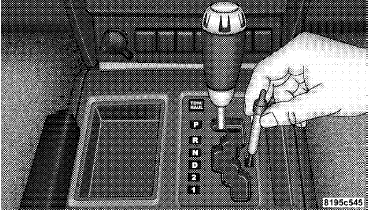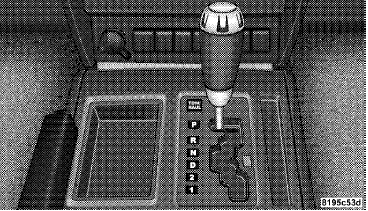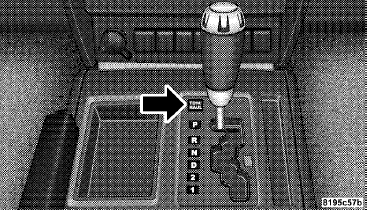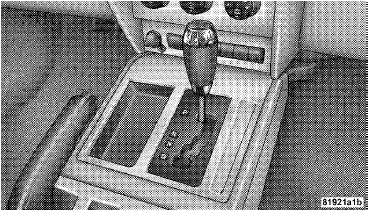 Dodge Nitro: Automatic transmission
Dodge Nitro: Automatic transmission
CAUTION:
Damage to the transmission may occur if the following
precautions are not observed:
ŌĆó Shift into PARK only after the vehicle has come to
a complete stop.
ŌĆó Shift into or out of REVERSE only after the
vehicle has come to a complete stop and the engine
is at idle speed.
ŌĆó Do not shift from REVERSE, PARK, or NEUTRAL
into any forward gear when the engine is above
idle speed.
ŌĆó Before shifting into any gear, make sure your foot
is firmly on the brake pedal.
WARNING:
ŌĆó It is dangerous to move the shift lever out of PARK
or NEUTRAL if the engine speed is higher than
idle speed. If your foot is not firmly on the brake
pedal, the vehicle could accelerate quickly forward
or in REVERSE. You could lose control of the
vehicle and hit someone or something. Only shift
into gear when the engine is idling normally and
when your foot is firmly on the brake pedal.
ŌĆó Never leave children alone in a vehicle. Leaving
unattended in a vehicle is dangerous for a number
of reasons. A child or others could be seriously or
fatally injured. A child could operate power windows,
other controls or move the vehicle.
Key Ignition Park Interlock
This vehicle is equipped with a Key Ignition Park Interlock which requires the shift lever to be placed in PARK prior to rotating the key to the LOCK position. The key can only be removed from the ignition when the ignition is in the LOCK position and once removed the shift lever is locked in PARK.
Brake/Transmission Interlock System
This vehicle is equipped with a Brake Transmission Shift Interlock System (BTSI) that holds the shift lever in the PARK position when the ignition switch is in the LOCK position. To move the shift lever out of the PARK position, the ignition switch must be turned to the ON or START position (engine running or not) and the brake pedal must be pressed.
Brake/Transmission Interlock Manual Override
Your vehicle may be equipped with a shift lock manual override. The manual override may be used in the event that the shift lever should fail to move from PARK with the key in the ON position and the brake pedal pressed. To operate the shift lock manual override, perform the following steps: 1. Turn the key to the ON position but do not start the engine. 2. Firmly set the parking brake. 3. Using a flat blade screwdriver, carefully remove the shift lock manual override cover which is located on the PRNDL bezel. 4. Press and maintain firm pressure on the brake pedal. 5. Using the screwdriver, reach into the manual override opening. Press and hold the shift lock lever down.
 Interlock Manual Override
Interlock Manual Override
6. Move the shift lever into the NEUTRAL position. 7. The vehicle may then be started in NEUTRAL. Have your vehicle inspected by your local authorized dealer if the shift lock manual override has been used.
FourŌĆōSpeed Automatic Transmission ŌĆō 3.7L Engine
NOTE: Under extreme cold temperatures (-10┬░F (-23┬░C) and when in DRIVE, transmission operation may be briefly limited to only second gear operation. Normal operation will resume once the transmission temperature has risen to a suitable level. Shifting from DRIVE to PARK or REVERSE should be done only after the accelerator pedal is released and the vehicle is stopped. Be sure to keep your foot on the brake when moving the shift lever between these gears.
 Shift Lever
Shift Lever
Gear Ranges
DO NOT race the engine when shifting from PARK or NEUTRAL position into another gear range.
PARK
This range supplements the parking brake by locking the transmission. The engine can be started in this range. Never use PARK while the vehicle is in motion. Apply the parking brake when leaving the vehicle in this range. Always apply the parking brake first, then place the shift lever in the PARK position.
WARNING:
ŌĆó Never use the PARK position as a substitute for
the parking brake. Always apply the parking
brake fully when parked to guard against vehicle
movement and possible injury or damage.
ŌĆó It is dangerous to move the shift lever out of PARK
or NEUTRAL if the engine speed is higher than
idle speed. If your foot is not firmly on the brake
pedal, the vehicle could accelerate quickly forward
or in REVERSE. You could lose control of the
vehicle and hit someone or something. Only shift
into gear when the engine is idling normally and
when your right foot is firmly on the brake pedal.
REVERSE
This range is for moving the vehicle backward. Use only after the vehicle has come to a complete stop.
NEUTRAL
This range is used when vehicle is standing for prolonged periods with engine running. Engine may be started in this range. Set the parking brake if you must leave the vehicle.
NOTE: Towing the vehicle, coasting, or driving for any other reason with shift lever in NEUTRAL can result in severe transmission damage. Refer to ŌĆ£Recreational TowingŌĆØ in ŌĆ£Starting and OperatingŌĆØ and ŌĆ£Towing a Disabled VehicleŌĆØ in ŌĆ£What To Do In EmergenciesŌĆØ for further information.
DRIVE
This range is used for most city and highway driving.
2 (Second)
This range is used for moderate grades and to assist braking on dry pavement or in mud and snow. Begins at a stop in low gear with automatic upshift to second gear. Will not shift into third gear.
1 (First)
This range is used for hard pulling at low speeds in mud, sand, snow, or on steep grades. Begins and stays in low gear with no upshift. Provides engine compression braking at low speeds.
Overdrive Operation
The overdrive automatic transmission contains an electronically
controlled fourth gear (OVERDRIVE). The
transmission will automatically shift from third gear into
OVERDRIVE if the following conditions are present:
ŌĆó the shift lever is in DRIVE.
ŌĆó vehicle speed is above approximately 30 mph
(48 km/h).
ŌĆó the TOW/HAUL button has not been activated.
The transmission will downshift from OVERDRIVE to
DRIVE if the accelerator pedal is fully pressed at vehicle
speeds above approximately 35 mph (56 km/h).
When To Use TOW/HAUL Mode
When driving in hilly areas, towing a trailer, carrying a heavy load, etc., and frequent transmission shifting occurs, press the TOW/HAUL button. This will improve performance and reduce the potential for transmission overheating or failure due to excessive shifting. When operating in TOW/HAUL mode, the transmission will shift into third gear.
NOTE: The TOW/HAUL mode locks out Overdrive.
 Tow/Haul Button
Tow/Haul Button
The ŌĆ£TOW/HAUL Indicator LightŌĆØ will illuminate in the instrument cluster to indicate when the switch has been activated. Pressing the switch a second time restores normal operation. If the TOW/HAUL mode is desired, the switch must be pressed each time the engine is started.
Transmission Limp Home Mode
Transmission function is monitored for abnormal conditions. If a condition is detected that could result in transmission damage, the Transmission Limp Home Mode will be engaged. In this mode, the transmission will remain in second gear in any forward driving range. To reset the transmission, use the following procedure: 1. Stop the vehicle. 2. Move the shift lever to the PARK position. 3. Turn the engine off and turn the key to the LOCK position.
4. Wait approximately 10 seconds, then restart the engine. 5. Move the shift lever to the desired gear range. If the problem is no longer detected, the transmission will return to normal operation. If the problem persists, PARK, REVERSE, and NEUTRAL will continue to operate. Only second gear range will operate in the DRIVE position. Have the transmission checked at your authorized dealer as soon as possible.
Torque Converter Clutch
A feature designed to improve fuel economy has been added to the automatic transmission of this vehicle. A clutch within the torque converter engages automatically at calibrated speeds. This may result in a slightly different feeling or response during normal operation in high gear. When the vehicle speed drops or during acceleration, the clutch automatically and smoothly disengages.
FiveŌĆōSpeed Automatic Transmission ŌĆō 4.0L Engine
The electronically controlled transmission provides a precise shift schedule. The transmission electronics are self-calibrating; therefore, the first few shifts on a new vehicle may be somewhat abrupt. This is a normal condition and precision shifts will develop within a few hundred miles/kilometers.
 Shift Lever
Shift Lever
Gear Ranges
NOTE: After selecting any gear range, wait a moment to allow the selected gear to engage before accelerating. This is especially important when the engine is cold. If there is a need to restart the engine, be sure to cycle the key to the LOCK position before restarting. Transmission gear engagement may be delayed after restarting the engine if the key is not cycled to the LOCK position first.
PARK
This range supplements the parking brake by locking the transmission. The engine can be started in this range. Never use PARK while the vehicle is in motion. Apply the parking brake when leaving the vehicle in this range. Always apply the parking brake first, then place the shift lever in the PARK position.
WARNING:
ŌĆó Never use the PARK position as a substitute for
the parking brake. Always apply the parking
brake fully when parked to guard against vehicle
movement and possible injury or damage.
ŌĆó It is dangerous to move the shift lever out of PARK
or NEUTRAL if the engine speed is higher than
idle speed. If your foot is not firmly on the brake
pedal, the vehicle could accelerate quickly forward
or in REVERSE. You could lose control of the
vehicle and hit someone or something. Only shift
into gear when the engine is idling normally and
when your right foot is firmly on the brake pedal.
REVERSE
This range is for moving the vehicle backward. Use this range only after the vehicle has come to a complete stop.
NEUTRAL
This range is used when vehicle is standing for prolonged periods with engine running. Engine may be started in this range. Set the parking brake if you must leave the vehicle.
NOTE: Towing the vehicle, coasting, or driving for any other reason with the shift lever in NEUTRAL can result in severe transmission damage. Refer to ŌĆ£Recreational TowingŌĆØ in ŌĆ£Starting and OperatingŌĆØ and ŌĆ£Towing a Disabled VehicleŌĆØ in ŌĆ£What To Do In EmergenciesŌĆØ for further information.
DRIVE
This range is used for most city and highway driving.
Electronic Range Select (ERS) Operation
The Electronic Range Select (ERS) shift control allows you to move the shift lever left (-) or right (+) when the shift lever is in the DRIVE position, allowing the selection of the desired top gear. For example, if the driver shifts the transmission into third gear, the transmission will never shift above third gear, but can shift down into second gear or first gear, when needed.
WARNING: Do not downshift for additional engine braking on a slippery surface. The drive wheels could lose their grip and the vehicle could skid.

NOTE: To select the proper gear position for maximum deceleration (engine braking), move the shift lever to the left ŌĆ£D (-)ŌĆØ and hold it there. The transmission will shift to the range from which the vehicle can best be slowed down.
Overdrive Operation
The overdrive automatic transmission contains an electronically
controlled fifth gear (OVERDRIVE). The transmission
will automatically shift from fourth gear to
OVERDRIVE if the following conditions are present:
ŌĆó the shift lever is in DRIVE.
ŌĆó the engine coolant has reached normal operating temperature.
ŌĆó the vehicle speed is above approximately 30 mph
(48 km/h).
ŌĆó the transmission has reached normal operating
temperature.
NOTE: If the vehicle is started in extremely cold temperatures, the transmission may not shift into OVERDRIVE and will automatically select the most desirable gear for operation at this temperature. Normal operation will resume when the transmission fluid temperature has risen to a suitable level. Refer to the ŌĆ£NoteŌĆØ under ŌĆ£Torque Converter ClutchŌĆØ later in this section. During cold temperature operation, you may notice delayed upshifts depending on engine and transmission temperature. This feature improves the warm up time of the engine and transmission. During cold temperature operation, the transmission may not downshift from second gear into first gear after the initial first to second gear upshift.
Transmission Limp Home Mode
Transmission function is monitored for abnormal conditions. If a condition is detected that could result in transmission damage, the Transmission Limp Home Mode will be engaged. In this mode, the transmission will remain in the current gear until the vehicle is brought to a stop.
To reset the transmission, use the following procedure: 1. Stop the vehicle. 2. Move the shift lever to the PARK position. 3. Turn the engine off and turn the key to the LOCK position. 4. Wait approximately 10 seconds, then restart the engine. 5. Move the shift lever to the desired gear range. If the problem is no longer detected, the transmission will return to normal operation. If the problem persists, PARK, REVERSE, and NEUTRAL will continue to operate. Only second gear will operate in the DRIVE position. Have the transmission checked at your authorized dealer as soon as possible.
Torque Converter Clutch
A feature designed to improve fuel economy has been included in the automatic transmission on your vehicle. A clutch within the torque converter engages automatically at a calibrated speed at light throttle. It engages at higher speeds under heavier acceleration. This may result in a slightly different feeling or response during normal operation in high gear. When the vehicle speed drops below a calibrated speed, or during acceleration, the clutch automatically and smoothly disengages. The feature is operational in OVERDRIVE and in DRIVE.
NOTE:
ŌĆó The torque converter clutch will not engage until the
transmission fluid and engine coolant are warm (usually
after 1 to 3 miles (1.6 - 4.8 km) of driving). Because
the engine speed is higher when the torque converter
clutch is not engaged, it may seem as if the transmission
is not shifting into OVERDRIVE when cold. This
is normal.
ŌĆó If the vehicle has not been driven in several days, the
first few seconds of operation after shifting the transmission
into gear may seem sluggish. This is due to the
fluid partially draining from the torque converter into
the transmission. This condition is normal and will not
cause damage to the transmission. The torque converter
will refill within five seconds of shifting from
PARK into any other gear position.
 Engine block heater
Engine block heater
The engine block heater warms the engine, and permits
quicker starts in cold weather. Connect the cord to a
standard 110-115 Volt AC electrical outlet with a
grounded three-wire extension cord. ...
 Four-wheel drive operation
Four-wheel drive operation
MP 143 Single-Speed Part-Time Transfer Case
Operating Information/Precautions
The transfer case is operated by the transfer case switch
(located on the center console).
Transfer Case Switch
T ...
See also:
Selecting songs
Turn or press ŌĆ£∧ŌĆØ or ŌĆ£∨ŌĆØ on
to select the desired song. ...
Folding front passengerŌĆÖs seat (if so equipped)
Folding front passengerŌĆÖs seat (if so
equipped)
The front passengerŌĆÖs seatback can be folded
down. Some long objects may be loaded in the
vehicle when the rear seats are also folded
dow ...
Using HomeLink
To operate, press and release the programmed
HomeLink button. Activation will now occur for the
programmed device (i.e., garage door opener, gate operator,
security system, entry door lock, home ...
